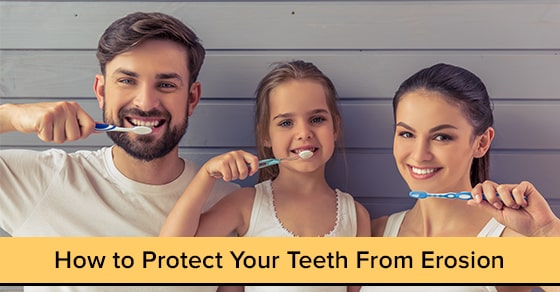
You are more than likely aware of the threat tooth decay poses for your dental health. However, tooth erosion poses just as much of a threat. When it comes to dental health, there are more factors at play than you might care to think about. It is not just sugary snacks that can be harmful to your teeth. Other foods and drinks that are high in acids can erode your enamel, the protective layer of your teeth. Once this happens, you suddenly expose your teeth to bacteria, increasing your risk for tooth decay, gum disease, and infection. Here’s how erosion affects your dental health and what you can do to help protect your teeth.
Your teeth have multiple layers. Your enamel is the outer layer that protects your teeth from daily wear and tear. It acts as an insulator from heat and cold and also protects against chemicals and bacteria.
Your enamel is actually the hardest, toughest tissue in your entire body. Your enamel is translucent, which means you can see light through it. Although it seems your enamel should logically be responsible for the colour of your teeth, it is actually the layer below the enamel, called the dentin, that determines the colour. This is because light shines through the enamel to reveal the white, grey, or yellow below.
Unfortunately, tooth erosion is permanent, so it is important to recognize the signs of erosion which include:
If you notice any of these signs, it’s time to give us a call.
As mentioned, tooth erosion is permanent. When allowed to progress, erosion can lead to cavities, abscess (infection), and even tooth loss. Although tooth erosion can’t be treated, the issues caused by erosion can be addressed with restorative treatments such as fillings, crowns, and root canals.
If erosion leads to discolouration, veneers and bonding are cosmetic dental treatments that can restore the appearance of your smile. In the worst-case scenario of tooth loss, replacements such as partial dentures, bridges, or implants are required.
Unfortunately, with enamel erosion even nutritious foods can prove risky. This is because acidic foods can damage tooth enamel, especially when eaten on their own. This can include tomatoes and citrus fruits.
Dried fruits such as raisins can also be problematic because they are sticky and can stay on your teeth, allowing bacteria to remain active and eating away at your teeth. Like cavity-causing foods and drinks, sugar plays a major role in erosion. This means if you aren’t already avoiding culprits such as soda and sports drinks, you should. As a rule, eliminate bubbly drinks as this can raise the level of acid.
Adding a slice of lemon or lime or enjoying natural citrus flavourings in drinks such as lemonade increases acid. Your best bet is to stick to water and just enjoy other drinks as a treat.
It probably goes without saying that any sweets are highly corrosive, especially popular “sour” candies. That sour flavour that makes you pucker up is caused by citric acid, which makes them even worse than regular candy.
Food and drink are not the only threat to tooth enamel. If you have stomach problems, this can put you at higher risk for tooth erosion.
The natural acids produced by your stomach help you digest food. However, if you experience stomach issues, stomach acids can be forced into your throat and mouth. Your saliva can help rebalance acid levels. However, when excess acid is left in your mouth, this is when the trouble begins.
This issue is common for those with gastroesophageal reflux (GERD) as this allows gastric acids to travel to your throat and mouth. When this happens at night, the acids become even more threatening as you swallow less and produce less saliva in your sleep.
Adding to the risk, many medications taken for stomach issues cause dry mouth. Your saliva is required to reduce bacteria, wash away food particles, and neutralize acids. A dry mouth in hand with stomach acid increases your risk for erosion and cavities.
You can protect your teeth from erosion by paying attention to your diet and using these helpful tips:
If you are living with acid reflux or GERD, you know it can be quite painful. There are ways you can reduce pain while protecting your teeth including:
Let us know if you have acid reflux, so we can assist in the prevention of tummy acid related erosion. At Oakville Place Dental, we are happy to discuss the best foods and beverages to promote dental health and avoid tooth erosion.
For more information or to set up an appointment with our team, call (866) 378-0026 or click here.
 0 Comment
0 Comment